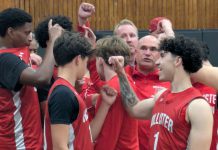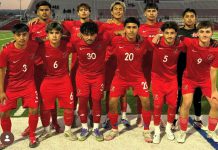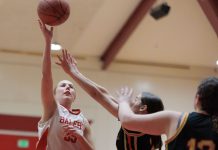
When a San Benito High athlete gets hurt, Danielle Techner is first on the scene. Techner, 29, is the school’s athletic trainer and teaches four sports medicine classes. Techner is present at every home sports event; if there are multiple games going on at the same time, Techner attends the contest that has “the most contact level.”
But Techner is always on call in that she can leave an event on a moment’s notice to tend to an injured player elsewhere. Techner covers every football game, including the freshmen and junior varsity contests. She also travels for road games. During the fall sports season, Techner was often at multiple events and practices on the same day.
Where’s Techner? She’s everywhere.
“It’s really great here,” said Techner, who was hired in the spring of 2014. “Everyone seems to respect what I say, and every time I give advice to athletes, they seem to respond well.”
Athletes and coaches at San Benito High should count themselves as fortunate to have Techner around. It’s estimated that only 40 percent of high schools in the nation have access to a part-time or full-time athletic trainer, according to USA Today.
“It’s really sad because serious things can happen,” Techner said. “Athletes need people who know how to handle athletic emergencies.”
Especially in an era where concussions have come to the the forefront, with prevention being paramount. Athletic trainers possess a variety of skills; among other things, they assess concussions, raise awareness on a variety of health concerns, administer tests to gauge whether the athlete can return to competition and help athletes in their rehabilitation, among other things.
Techner has extensive training in concussion protocol and all things related to her field, as she attends conferences every year and reads books to keep up to date on the latest medical news and discoveries. Born and raised in Santa Cruz, Techner did her undergraduate work at San Francisco State before spending a year each at the University of Hawaii and Bridgewater State University in Massachusetts for her master’s in science training.
Techner attended two schools for her master’s because budget cuts at Hawaii forced her to look elsewhere to complete the degree. Upon graduation, Techner got a job at UC-Santa Cruz in October of 2011 and worked there for three years before getting the position at San Benito.
Since Techner has several responsibilities, she never knows how each day will unfold. Whenever an athlete suffers a serious injury, Techner remains calm even though her heart rate might say otherwise. After all, athletic trainers are trained to deal with emergencies.
“Your instinct takes over even though there’s a lot of things going on,” she said. “It’s surprising to me how little you need to think through everything because your gut and instincts take over. Because of the training we do in medical school, you learn how to handle crazy situations.”
Techner faced that very situation in her year studying at Bridgewater State, when a men’s soccer player suffered a leg fracture so serious that Techner remembers the sound to this day.
“It was the loudest sound ever,” she said. “His leg was pointing in the wrong direction and that was when instinct kicked in and there was a sense of calm I had in dealing with that situation. That’s when I realized and thought, ‘OK, I can do this. I can be an athletic trainer.’”
Techner’s passion to become an athletic trainer started in high school, when she learned about the profession. Techner was a varsity diver and water polo player at Soquel High. Before that, she was a competitive gymnast. In between her paid jobs, Techner has literally accumulated thousands of hours gaining experience at the colleges she attended along with places such as Skyline College in San Bruno and City College of San Francisco, where she was a volunteer athletic trainer for two to three years.
Techner also gained valuable experience over the years taking part in psychotherapy clinics and camps. All of the hard work has paid off, and Techner loves every minute of it.
“The job is fun because every day is different,” she said. “The challenge is getting everything in order and making sure everyone is happy, from the athletes to the coaches.”
In short, Techner is living out a dream as a teacher and trainer, educating students and providing aid to athletes on the spot.









